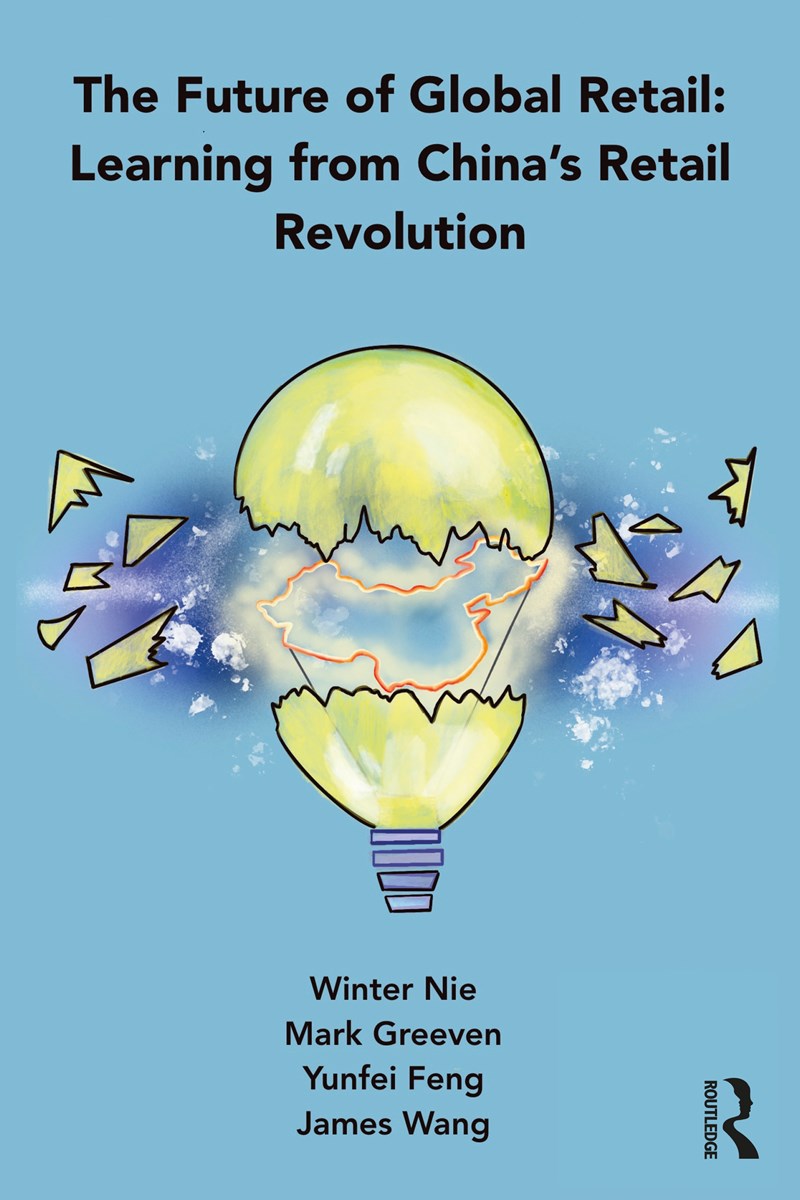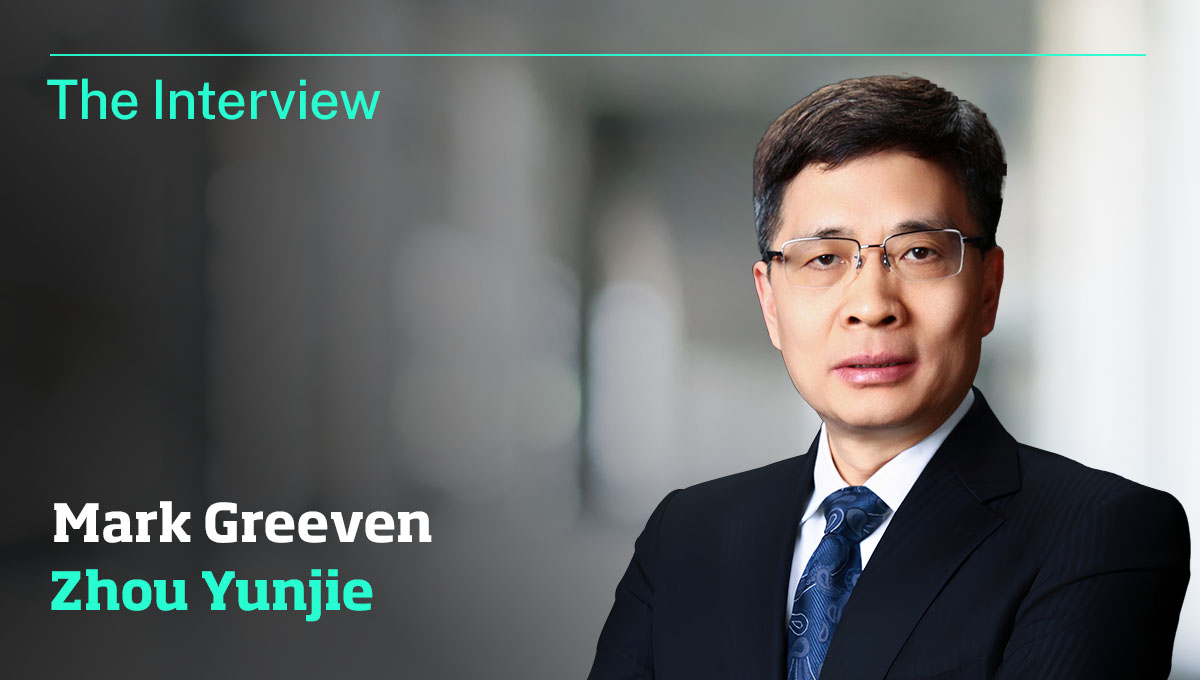
New Retail is one of the most visible examples of China’s undisputed areas of leadership. This book does an excellent job of describing what it is and its various business models. More importantly through its comprehensive analyses, it unfolds all its complexity and phenomenal impact within the country and on the rest of the world.
FMCG executives all over the world need to understand how the Chinese retail and digital ecosystem is already completely redefining consumers expectations from their brands. This eye-opening and insightful book can help you prepare for the new world coming your way.
In my 30 years of living and working in China, this is the first book that I have read that fully articulates and analyses the history and key players involved in the e-commerce revolution in China. It is a must-read for anyone or any company that wants to enter the China retail market or to learn about global e-commerce trends.
This book offers powerful insights. It challenges us in industries and regions outsides China to learn from these developments. As boundaries of service, product and market blur, this book compels us to ask hard questions and find dynamic solutions before it is too late.
China’s new retail revolution will completely transform how the world thinks about retail and digital innovation. But are we ready? In this book, we share an insider’s perspective on what is happening in China to reveal the future for global retail – and we provide a clear framework to help you prepare.
Through a comparative analysis of a huge collection of cases, based on interviews and secondary sources and, of course, first-hand consumer experience, we decode China’s retail revolution for global retail and innovation executives, so they can understand what is going on and why, and what it means for the rest of the world.
Crucially, from our research, we have identified five critical stages in the development of new retail that global retail executives need to grasp now: lifestyle commerce, Online-Merge-Offline retail, social retail, livestream retail and invisible retail.
To help the industry get ready for this new, China-inspired paradigm in retail, we have developed a practical and simple framework – a ten year strategic roadmap for global retail executives, which we call the “Beyond” Value Chain Model.
China’s new retail is not just about fashion, cosmetics, snacks, data-driven convenient stores and commercial live streaming. It offers a gold mine of inspirational lessons in innovation, purpose and agility for global executives across the entire retail spectrum.
For example, Meituan started out as a group-buying business but has evolved into a super-platform providing a wide variety of location-based services. Hema Fresh, which established its first store in 2016 in Shanghai, offers a new retail format that is a combination of physical stores, online app, eat-in food court and fresh-food deliveries. Pinduoduo, having acquired over 700 million active users within five years, pioneered a social e-commerce platform. If Hema built the fresh-food supply chain, then it was Pinduoduo that revolutionised the link between the underserved, low-income populace and multiple small and medium-sized manufacturers. And it is not just Viya that has benefitted from livestream selling, with US$4.5 billion revenue in 2020. Known mostly in the Western world for her artistic short videos on YouTube, Li Ziqi generates more than RMB1 billion (US$140 million) a year through her online Tmall store.
The book has 12 chapters and can be divided into four parts. The first part includes Chapter 1, the introduction. The second part includes Chapters 2, 3, 4 and 5, which provide the four foundations of new retail in China. The third part includes Chapters 6, 7, 8, 9 and 10, which explore the five stages of new retail. The final part includes Chapters 11 and 12, which summarise and refine the key learnings.
Research Information & Knowledge Hub for additional information on IMD publications
- Four things you can learn about retail from China
- The future of global retail: Learning from China's retail revolution
- Four things you can learn about retail from China
- The future of global retail: Learning from China's retail revolution

You can also buy the book on Barnes & Nobles, Book Depository, Orell Füssli and Routledge.
Research Information & Knowledge Hub for additional information on IMD publications
Research Information & Knowledge Hub for additional information on IMD publications

Profile
Winter Nie’s expertise lies at the intersection of change management and leadership, with a focus on strategy, team dynamics, and change initiatives. She has a deep understanding of how people at different levels in an organization react to change and how leaders can effectively manage resistance and organizational dynamics.
Nie says companies are always dealing with tensions in relation to their external environment, strategic direction or internal capabilities, and that there are no perfect answers that always apply – everything depends on the individual company’s situation, purpose, strategy, and positioning – but she is able to help leaders skillfully navigate through these tensions into the future.
She is trained in psychodynamics as well as business, holding a Tavistock Consulting Advanced Certificate in Decoding Group Dynamics and certifications in several psychometric instruments on leadership and organizational development, so a lot of her work focuses on top management team dynamics. She helps business leaders to improve team dynamics where necessary, but also to identify situations where problems may have their roots in the strategy or external environment rather than the dynamics of the team.
Nie is also able to guide companies through organizational transformation and change initiatives, believing that the only way to keep up with the unrelenting pace of change in the world is to constantly learn, unlearn and relearn, with openness, courage, and humility.
She is particularly well equipped to provide support on strategic initiatives in areas such as customer centricity, moving from products to solutions, and operational/service excellence, and she has in-depth knowledge of doing business in emerging markets, low-cost competition, and innovation culture.
Nie works with companies who want to embark on organizational transformation at the individual, team, and organizational levels, looking beyond surface rationality into the unconscious forces below that shape the direction and speed of change. She also supports companies with senior leadership development, including work with both Western and Chinese companies on CEO and senior executive succession. Her advice is always anchored in the organization’s goals and business requirements and leverages her keen observations of team dynamics and individual behaviors and insights into human nature.
She has worked with many global companies in a wide range of industries, including engineering and technology, service and consulting professions, fast-moving consumer products, banking and finance, telecommunications, pharmaceuticals, gaming, and the internet, and sits on the boards of Singaporean software company Opsis and Chinese e-commerce group Valuesense.
Nie teaches on IMD’s flagship Orchestrating Winning Performance (OWP) program and is Dean of IMD China with responsibility for the school’s business development and client relationships in the country. She also served as IMD’s Regional Director of Southeast Asia, Australia, New Zealand, and Oceania until 2019.
She is the author of several books and articles in academic and practitioner-oriented journals.
Her 2021 book The Future of Global Retail: Learning from China’s Retail Revolution provides a roadmap to help global retail executives prepare for the decade ahead, drawing on lessons on innovation, purpose and agility in emerging markets. Nie and co-authors Mark Greeven, Yunfei Fang and James Wang call this framework the “Beyond” Value Chain Model.
Her MIT Sloan Management Review article “Rethinking the East Asian Leadership Gap” showed how the difficulties experienced by many multinationals in identifying managers with leadership potential in East Asia are more to do with prevailing Western views of leadership than about available talent.
Nie’s 2012 book In the Shadow of the Dragon: The Global Expansion of Chinese Companies – and How It Will Change Business Forever provides insights into subtle yet powerful strategies used to gain market dominance, key players’ approach to going global and the Chinese way of innovation, and her 2009 title Made in China – Secrets of China’s Dynamic Entrepreneurs explains how multinationals can compete or work with Chinese entrepreneurs.
Before joining IMD in 2006, she was a tenured Associate Professor at Thunderbird School of Global Management in the United States.
Selected publications
The Future of Global Retail: Learning from China’s Retail Revolution (Routledge, 2021)
Rethinking the East Asian Leadership Gap (MIT Sloan Management Review, 2017)
In the Shadow of the Dragon: The Global Expansion of Chinese Companies – and How It Will Change Business Forever (AMACOM, 2012)
Made in China: Secrets of China’s Dynamic Entrepreneurs (John Wiley & Sons, 2009)
Recognition
John Molson MBA International Case Writing Competition award (2022)
Education
BS (Economics)
Zhejiang University, China
MBA
University of Montana
PhD (Operations Management)
University of Utah

Mark Greeven draws on a decade of experience in research, teaching and consulting in China to explore how to organize innovation in a turbulent world. He was named on the prestigious Thinkers50 Radar list of 30 Next Generation Business Thinkers in 2017.
Greeven has collaborated with innovative Chinese companies (such as Ping An, Alibaba, Pinduoduo, Haier) and entrepreneurial multinationals (including Bayer, Evonik, Johnson & Johnson, Daimler, Nestlé, Richemont, Swiss Re) to explore novel ways of organizing, accelerating corporate innovation, enabling digital business transformation and designing business ecosystems to thrive on uncertainty. He is a fluent Chinese speaker.
He is the author of three books in this field.
His 2018 work Business Ecosystems in China: Alibaba and Competing Baidu, Tencent, Xiaomi and LeEco, which has a cover endorsement by renowned venture capital investor Tim Draper, explores the application of a business ecosystem approach in the Chinese context, and offers insights and practical lessons on leading, creating and disrupting markets for corporate executives and professionals in global business.
This was followed in 2019 by Pioneers, Hidden Champions, Change Makers and Underdogs: Lessons from China’s Innovators, which provides an insider’s view of China’s under-the-radar, globally competitive innovators. The book has a cover testimonial from Henry Chesbrough, Adjunct Professor at University of California, Berkeley.
Most recently, his 2021 book The Future of Global Retail decodes China’s retail revolution to help global retail and innovation executives understand its implications for the rest of the world. The publication, co-authored with Winter Nie, Yunfei Fang and James Wang, has a cover endorsement from Jørgen Vig Knudstorp, Executive Chair, the LEGO Brand Group.
At IMD, he is Director of the new Digital Ecosystem program that is being launched in partnership with Cheung Kong Graduate School of Business. As Dean of IMD China, he is also responsible for the school’s activities and outreach in the country. Greeven is a founding member of the Business Ecosystem Alliance, a research associate at China’s National Institute for Innovation Management, the Center for China and Globalization and the Center for Global R&D and Innovation.
Findings from his research have been featured in international academic journals, such as Harvard Business Review, MIT Sloan Management Review, European Management Journal and Asia-Pacific Journal of Management, as well as in global media such as Forbes, the Financial Times, Wired, CNN, Bloomberg, Fast Company, Dialogue, LSE Business Review, The Business Times, Le Temps, Nikkei Asian Review, The Telegraph, South China Morning Post and China Daily.
Before joining IMD in 2019, he held faculty positions at Zhejiang University in China and the Rotterdam School of Management in The Netherlands.
Selected publications
The Future of Global Retail (Routledge, 2021)
Why some retailers are thriving amid disruption (MIT Sloan Management Review, 2020)
How autonomy creates resilience in the face of crisis (MIT Sloan Management Review, 2020)
In a crisis, ecosystem businesses have a competitive advantage (Harvard Business Review, 2020)
Pioneers, Hidden Champions, Change Makers and Underdogs: Lessons from China’s Innovators (MIT Press, 2019)
Understanding China’s next wave of innovation (MIT Sloan Management Review, 2019)
Business Ecosystems in China: Alibaba and Competing Baidu, Tencent, Xiaomi and LeEco (Routledge, 2018)
Recognition
Case Centre Outstanding Case Teacher Award nominee (2018)
Named on Thinkers50 Radar list of management thinkers to watch in the coming year (2017)
Benelux Chamber of Commerce in China Personality of the Year (2017)
Education
MSc (Business Administration – International Strategic Management)
Erasmus University Rotterdam
PhD (Innovation Management)
Rotterdam School of Management, Erasmus University

Yunfei Feng is a researcher at IMD and had many in-depth interviews and discussions with the Chinese executives. She has kept up with the most cutting-edge development in China’s e-commerce and digital space. She had her own entrepreneurial venture in online business education.

James Wang is an economist and a Professor of Finance at City University of Hong Kong. His commentaries, written for hedge fund managers, on topics such as Sino-American relations, style and substance of the 5th-generation leaders of China, prospects of SOE reforms and other contemporary topics, were collected in the book Early Innings of A Long Game.
For further information, an interview with the authors, a guest article or a review copy of Hacking Digital: Best Practices to Implement and Accelerate Your Business Transformation, please contact us: [email protected]

China's technology sector leads global innovation with AI, semiconductor growth, and strategic diversification. R&D investments fuel success amid regulatory challenges.

China’s apparel sector in 2025 sees local brands rise and global players adapt amid digital, Research & Development, and innovation-led growth.

Explore how innovation, R&D, and policy reforms are reshaping China’s pharmaceutical sector amid rising healthcare demand and demographic shifts.
The case study introduces an original way of exploring the many questions and concerns around AI adoption in business. Based on a true story, it discusses the dilemma of AI implementation through Joe, the CIO of ParcelFlow. Joe is getting ready to...
This case study explores AstraPay’s journey to become a significant player, despite its latecomer status, in Indonesia’s burgeoning digital payments landscape. Launched in 2018, AstraPay had grown to serve over one million customers, but it faced ...
It's a reversal of the situation: Chinese automaker BYD is offering to collaborate with former electric car pioneer Tesla. From drones to livestream trading to artificial intelligence: China is often ahead of the West.

Haier's CEO Zhou Yunjie explains how the company's innovative RenDanHeYi model empowers employees, drives global growth, and adapts to market changes.
US President Donald Trump’s full embrace of digital assets has sent shock waves through the cryptocurrency market, driving a price surge while creating both new opportunities and heightened risks for investors and corporations. Last week, Mr Trump...
The case explores TBC Bank Group’s remarkable journey from a small Georgian bank to a regional leader in digital financial services across Central Asia. Founded in 1992 with just US$500 in initial capital, TBC evolved into Georgia’s largest financ...
The case explores the principles and challenges of operational excellence through the experience of Magdi Batato, former EVP of Operations at Nestlé. It examines how he implemented Mission-Directed Work Teams (MDWTs) to empower front-line workers,...
Research Information & Knowledge Hub for additional information on IMD publications
Research Information & Knowledge Hub for additional information on IMD publications
Research Information & Knowledge Hub for additional information on IMD publications
Research Information & Knowledge Hub for additional information on IMD publications
Case reference: IMD-2650 ©2025
Research Information & Knowledge Hub for additional information on IMD publications
Research Information & Knowledge Hub for additional information on IMD publications
Research Information & Knowledge Hub for additional information on IMD publications
Research Information & Knowledge Hub for additional information on IMD publications
Research Information & Knowledge Hub for additional information on IMD publications
Research Information & Knowledge Hub for additional information on IMD publications






